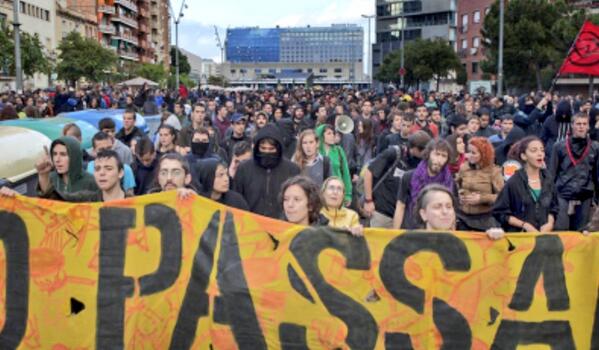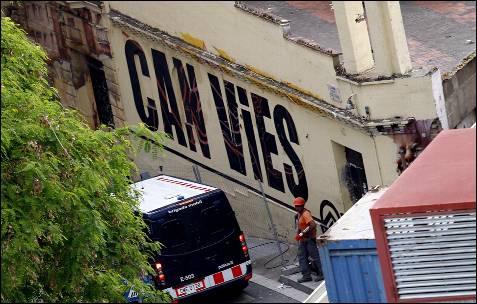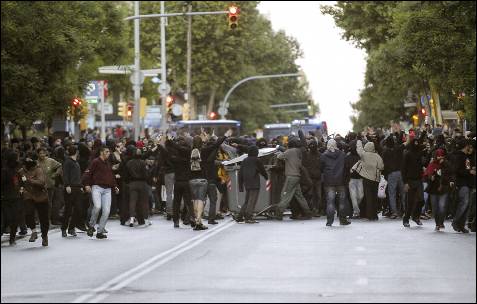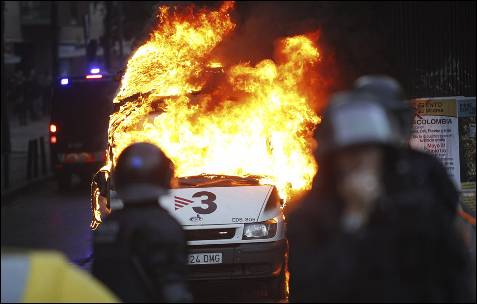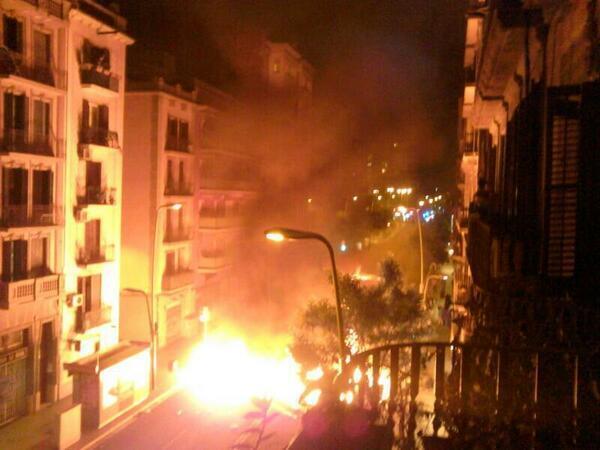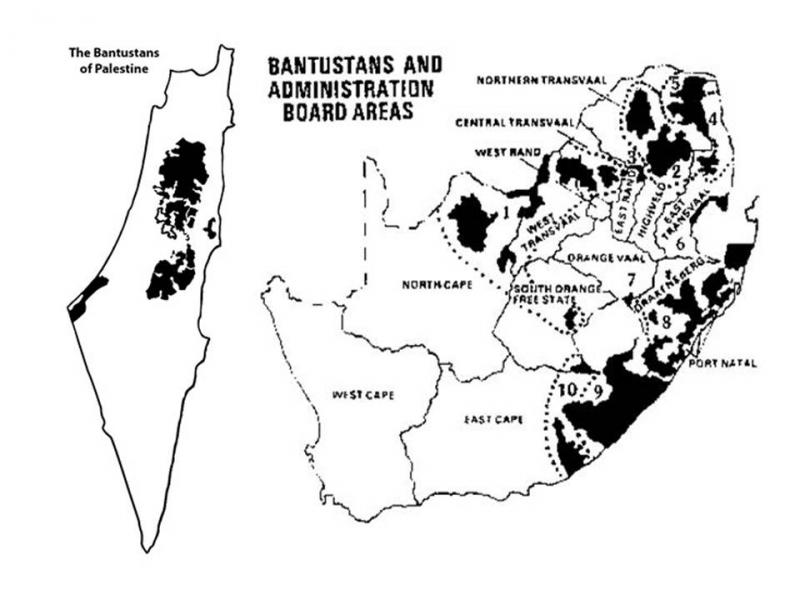 |
| Electoral results in Spain (May 2014) |
There is little doubt that the European Elections of last Sunday represent a turning point of some sort in the political history of the Spanish state. As mentioned before, the twin-party has nearly collapsed although it retains the ability to form a wide coalition at the style of Greece, Italy or Germany in order to secure the interests of the international and local Big Capital against the people.
While United Left (running as The Plural Left) did manage to gain some one million votes and become the third political force with 10% of the vote, this is still under their best historical achievements and no doubt that there is a bitter-sweet aftertaste among their ranks, considering the anger that runs through the population.
To the surprise of all, the newly formed irregular party Podemos (We Can) gathered another 1.2 million votes and became the fourth force. Another million votes went for Left-leaning independentist lists and 300.000 for the Green party Equo. Total 4.1 million votes and 26% of the votes, the same as the ruling PP and more than fake opposition PSOE.
Apology of Podemos or why the upstarts threaten the old school aparatchik
Nega, singer of Los Chikos del Maíz and supporter of Podemos, was interviewed this week by Kaos en la Red, and he explains quite well the reasons behind the surge of this political phenomenon.
He vindicates the historical Pablo Iglesias, founder of the PSOE and namesake of the leader of Podemos, as someone who supported worker violence against the bourgeoisie, something unthinkable in the current liberal party that the PSOE has become.
Does anyone imagine him earning 8000 euros [monthly] and flying in business class?
He defends the irregular grassroots organization of Podemos in "circles" and cites Lenin as reference:
Lenin said that the relationship of the party with the masses must be reciprocal: the party learns from the masses and the masses learn and gain formation from the party. Well, we have been for too long not learning from the masses. It is about time to step down form our glass ballot boxes and our pedestals, and, instead of talking so much from the pulpits about ideological purity, shut up for a while and pay attention to what the people has to say.
He uses his own formerly apathically apolitical brother as example of why the Podemos formula works: he spontaneously began spreading propaganda of the party in the neighborhood and the Internet and, after the elections, demanded that everything must remain the same: that every decision must be voted.
Nega goes on to say that the rich must pay their share of the taxes or risk nationalization, something he says is possible even in the context of the current Spanish constitution. Then he claims against poverty and malnutrition.
We don't have the sickle and the hammer in the statutes but we know a bit of political science and are therefore very conscious that this is a dialectic relationship: in order to allow for millionaires in a yacht drinking champagne at 200 euros the bottle, there must be children fainting in the schoolyards because they don't eat three times a day.
On their competitors of similar ideology, United Left (Communist Party and allies), he makes some major criticisms. On one side Nega explains that it is not about a mere gathering of a letter soup of parties: that what really matters is to mobilize all those people that are potentially in the Left but are not being seduced by the dynamics of the parties. He criticizes that the first positions in the electoral ballot of United Left were reserved for the aparatchik and that instead of appointing a popular figure like Javier Couso (social activist since the 1980s and brother of a journalist murdered in Baghdad by the US Army in 2003). As supposed "wink" to the social movements they included a member of of the mainline union CC.OO., which has lost most of its initial appeal by collaborating with the bourgeoisie and becoming a largely corrupt bureaucracy.
Obviously these are the kind of decisions that can only harm the Left: existing in a sectarian-bureaucratic bubble. And in this sense the rise of Podemos appears to be at the very least a strong call of attention for all the established political organizations of the Left.
How is this solved? Giving the power back to the People. Or does anyone really think that would there have been internal elections, Meyer would have been elected instead of Couso?
Another somewhat interesting article can be found at Canarias Semanal, where Arturo Borges wonders
if we can actually move the mountains with Podemos. He hopes so and
appeals to overcome the traditional inertias that have cramped the Left
in the plurinational realities of the Spanish state, including the
differences between unionists (federalists) and nationalists
(secessionists). He hopes that the grassroots democratic nature of
Podemos helps decisively in this advance but he also questions the very
notion of "left", arguing instead for a division between the people and
the oligarchy.
Criticisms of Podemos and United Left
There are a number of other interesting articles these days in Canarias Semanal, a leftist weekly magazine.
According to Manuel Medina, even someone as the Governor of the Bank of England could well have voted for these formations because he actually delivered a speech that was almost exactly the same as the way too moderate electoral program of the Left parties. Mark Carney declared that:
Capitalism is at risk of self-destruction if bankers ignore their obligation of creating a more just society.
Adding that:
A Capitalist system that causes these situations of misery is just not sustainable. Prosperity requires not just investing in economic capital but also in social capital.
His advise is similar to the kind of proposals that the Left parties spouse in their programs: severe correctives for those financiers who don't fulfill the social needs.
And that is what spooks Medina: that their discourses are so similar. Nothing about revolutionary collectivizations but just some corrective spanking and taxing for the ultra-rich. Way too moderate, no doubt.
Podemos is clearly considering electoral unity with United Left and it would be interesting indeed if the resulting coalition gets the best of both formations. United Left has not yet said a word though.
However one of the Podemos' new MEPs, former anti-corruption chief attorney Carlos Jiménez-Villarejo, has suggested also electoral unity with the liberal PSOE, so discredited after accepting all the IMF impositions and retaining the extremely unpopular Secretary General and former Interior Minister Pérez Rubalcaba, which has now resigned. It is not of course a problem of Pérez Rubalcaba alone but one affecting the whole party which has drifted way to the right in the last decades, losing credibility as result.
The alternative candidates to Rubalcaba (Madina, Chacón, etc.) are younger, more confident and less ugly but they do not represent substantial changes in political orientation at all, so the PSOE is almost certainly going to be the same liberal party that supports the dictatorship of the bourgeoisie with mere occasional winks to the demands of the masses: a reformist party that does not even reform anything anymore.
While the main leader of the upstart formation, Pablo Iglesias, has also suggested in the past this kind of political pragmatism in government, he has never gone as far as to suggest electoral unity with such a discredited formation as the PSOE.
However it is true that many of the members of Podemos, including Pablo Iglesias himself, are disgruntled militants of this party and naturally they feel some sympathy for their former political home. On the other hand it is also true that many disgruntled supporters of other more radical Left-wing parties, including people who have openly opposed these flirtations with the PSOE, have seen in Podemos some hope, precisely because it challenges the established aparatchiks with their grassroots direct democracy irregular structure, allowing for much greater plurality.
Bolivarian and proud
As colophon, I found interesting this apology of Bolivarianism in the same Canarian magazine by Francisco González Tejera, because in practical terms the Latin American Left rallied around the Bolivarian label and praxis (in power in Venezuela, Bolivia, Ecuador, Nicaragua, etc.) is the only real Left reference globally right now and can only be a major reference for us Europeans as well, and particularly in the context of the Spanish state, linked to America by language and history (for the good and for the bad).
It is quite apparent that something like Bolivarianism is as far as the institutional Left reaches in Europe right now. Capitalism as such is not really questioned but only put under control by the power of the state (classical social-democracy by another name and maybe with a slightly more flaming discourse).
González wonders what is the problem with being Bolivarian...
If being Bolivarian is being against the plunder of our citizen rights, against the destruction of the natural heritage, against the sell-out of health care and public education, gifted to corrupt companies, against the mass evictions of whole families from their homes, against the murder by suicide of 20 desperate people every day, pushed by the corrupt regime, against the existence of six million of unemployed souls, against child famine, against generalized political corruption.Indeed this is its meaning. I am Bolivarian, Libertarian, Revolutionary and I have no reasons to feel ashamed of fighting for justice, freedom and true democracy.




